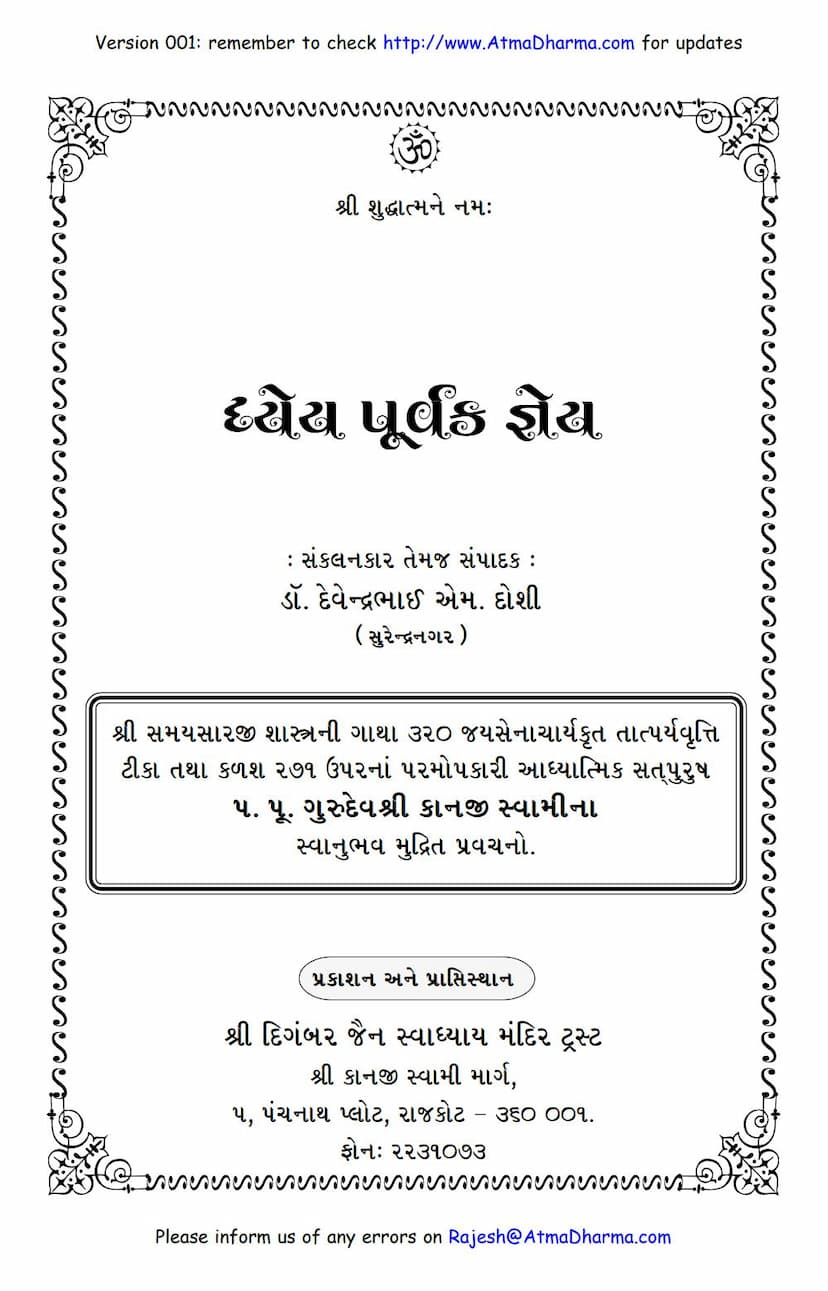Dhyey Purvak Gney
Added to library: September 1, 2025

Summary
This Jain text, "Dhyey Purvak Gney" (Devotedly pursuing the Goal, Knowable), authored by Kanjiswami and published by Shri Digambar Jain Swadhyay Mandir Trust, is a compilation of discourses by Pujya Gurudev Shri Kanji Swami. The book focuses on the essence of the Samaysar scripture, specifically elaborating on the 320th verse and the 271st verse (Kalash). The discourses were delivered by Shri Kanji Swami, a prominent spiritual figure of the Digambar Jain tradition, and compiled and edited by Dr. Devendra M. Doshi.
The central theme of the book revolves around understanding the true nature of the "Dhyey" (Goal) and the "Gney" (Knowable) within the framework of Jain philosophy, particularly as expounded in the Samaysar. The discourses delve into the concept of the self (Ātman) as the ultimate reality, emphasizing its inherent nature as pure consciousness, devoid of any actions or attachments to external or internal states.
Here's a breakdown of the key themes and concepts discussed in the text:
Core Concepts and Teachings:
- The Nature of the Soul (Ātman): The book's primary focus is on elucidating the soul's true, eternal, and pure nature. It describes the soul as the "Dhyey" (Goal) to be realized and the "Gney" (Knowable) itself. The soul is characterized as pure, conscious, bliss-filled, and unchanging, existing beyond the limitations of the physical body, senses, emotions, karma, and external circumstances.
- The Soul as the Ultimate Reality: The discourses strongly advocate for the soul's self-identity. The soul is not the body, not the mind, not the senses, not the emotions, not the karma, and not any external object or state. It is pure consciousness, an independent and eternal substance.
- Rejection of External Attachments: The text consistently steers the reader away from seeking happiness or liberation through external actions, rituals, or even virtuous activities like devotion, charity, or penance. These are considered external and ultimately delusory if not rooted in the realization of the soul's true nature.
- The Importance of Self-Knowledge (Ātmagnānam): The central message is that true liberation (Moksha) is attained through self-knowledge – the direct, experiential realization of the soul's pure, eternal, and blissful nature. This is achieved through introspection and focusing the consciousness inwards, on the soul itself.
- The Soul as the Knower (Jñātā): A significant portion of the text emphasizes the soul's nature as the pure knower (Jñātā). The soul's function is to know, to be aware, without getting involved or attached to what it knows. The world, its phenomena, and even the soul's own states (like consciousness) are objects of knowledge (Gney), but the soul itself is the ultimate Knower (Jñātā).
- The Soul as the Knowable (Gney): Simultaneously, the soul is also the Knowable. The soul is the object of its own knowledge. This self-knowledge is the path to liberation. The text clarifies that the "Gney" is not just external objects but also the soul's own essence, which is to be realized.
- Distinction between Substance (Dravya) and Mode (Paryāya): A crucial philosophical point made is the distinction between the eternal, unchanging substance (Dravya) of the soul and its transient modes or states (Paryāya) like consciousness, bliss, or even spiritual realization. While the soul is the unchanging substance, the realization of its nature manifests as a mode or state. The ultimate aim is to realize the true substance beyond the modes.
- The Nature of Moksha (Liberation): Liberation is not an external attainment but the direct realization of the soul's inherent, already existing pure state. It's about recognizing and dwelling in the soul's unadulterated nature, which is beyond birth, death, bondage, and freedom.
- The Role of Reason and Discrimination: The discourses highlight the importance of right reasoning (Yukti) and deep contemplation to overcome misconceptions and realize the soul's true nature. The text challenges conventional religious practices that rely on external actions or beliefs, guiding the seeker towards a profound internal realization.
- Critique of Ritualism and Externalism: The discourses subtly critique practices that focus on external rituals, idol worship, or mere intellectual understanding of scriptures without the inner realization of the soul. True spirituality, according to these teachings, is an inner experience.
- The Soul is the Goal and the Means: Ultimately, the soul itself is the Goal, the Knowable, and the Knower. The path to self-realization is through the soul's own introspection and awareness, not through external means.
Structure of the Book:
The book is structured around the commentaries and discourses on specific verses and couplets of the Samaysar. The table of contents indicates two main sections:
- Section 1 (Nature of the Goal): Comprises discourses on the 320th verse of Samaysar and the commentary by Acharya Jayasen.
- Section 2 (Nature of the Knowable): Consists of discourses on the 271st verse (Kalash) of Samaysar.
- Appendix: Includes supplementary material.
Key takeaway message:
The book "Dhyey Purvak Gney" is a profound spiritual guide that aims to lead the reader towards the direct realization of the soul's true, liberated, and blissful nature. It emphasizes introspection, self-knowledge, and the understanding that the soul is the ultimate reality, beyond any external or internal states of existence. The teachings are presented in a clear, accessible, and deeply insightful manner, characteristic of Pujya Kanjiswami's spiritual discourse.